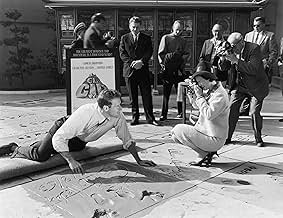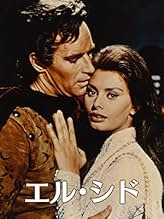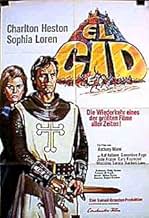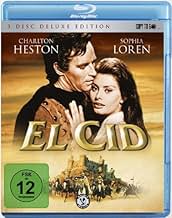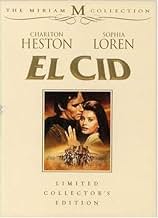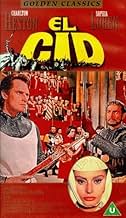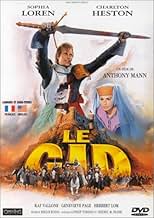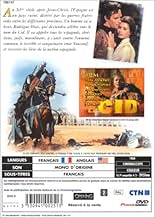The fabled Spanish hero Rodrigo Diaz de Vivar (a.k.a. El Cid) overcomes a family vendetta and court intrigue to defend Christian Spain against the Moors.The fabled Spanish hero Rodrigo Diaz de Vivar (a.k.a. El Cid) overcomes a family vendetta and court intrigue to defend Christian Spain against the Moors.The fabled Spanish hero Rodrigo Diaz de Vivar (a.k.a. El Cid) overcomes a family vendetta and court intrigue to defend Christian Spain against the Moors.
- Nominated for 3 Oscars
- 7 wins & 13 nominations total
Geneviève Page
- Princess Urraca
- (as Genevieve Page)
Gérard Tichy
- King Ramírez
- (as Gerard Tichy)
Featured reviews
El Cid is the story of legendary Rodrigo Diaz who lifted his country with valour and integrity to drive the Moorish invaders from Spain.
I think the best thing I can say about this film is that even though it's nearly three hours long, I never once look at the clock. It's a thoroughly engaging picture that boasts all the great hallmarks of a sweeping historical epic. The colour, the costumes, the scope, and the attention to detail from director Anthony Mann are first rate, and par for the course is the suitably rousing score from Miklos Rozsa. Big square jawed bronzed beefcake Charlton Heston takes the lead role as Diaz, and firmly cements himself as the go to guy for gargantuan epics. Support comes in the form of Sophia Loren, Genevieve Page, Raf Vallone, John Fraser (excellent), and Gary Raymond (also excellent).
The story is an excellent one because Diaz was such a fine character from the annals of Spanish history, uniting the sulking Christian kings of Spain whilst simultaneously lifting the people of the streets off their knees and getting them to believe in the cause. However, it has to be said that this is far from the perfect historical epic movie, even allowing for the usual Hollywoodisation of facts, one can't quite get past the fact that El Cid comes across as a glamorised glory tale without any hindrances. Surely here in the 11th century El Cid's path would have been fraught and sodden with a great deal more death and destruction? There's a tameness where there should be serrated edges to the story and it takes away greatly from the film's end because the build up of Cid's heroism actually didn't contain a great deal of hard work - it was a stroll in the park so to speak.
Still, it's a wonderful film that ticks all the boxes for genre staples, and as churlish as I may be as regards the assumptive nature of El Cid's story being told here, I'm still the first to start cheering and thumping my chest as the credits role, and not even Sophia Loren's pout can distract me from the bravado warmth washing over me. 8/10
I think the best thing I can say about this film is that even though it's nearly three hours long, I never once look at the clock. It's a thoroughly engaging picture that boasts all the great hallmarks of a sweeping historical epic. The colour, the costumes, the scope, and the attention to detail from director Anthony Mann are first rate, and par for the course is the suitably rousing score from Miklos Rozsa. Big square jawed bronzed beefcake Charlton Heston takes the lead role as Diaz, and firmly cements himself as the go to guy for gargantuan epics. Support comes in the form of Sophia Loren, Genevieve Page, Raf Vallone, John Fraser (excellent), and Gary Raymond (also excellent).
The story is an excellent one because Diaz was such a fine character from the annals of Spanish history, uniting the sulking Christian kings of Spain whilst simultaneously lifting the people of the streets off their knees and getting them to believe in the cause. However, it has to be said that this is far from the perfect historical epic movie, even allowing for the usual Hollywoodisation of facts, one can't quite get past the fact that El Cid comes across as a glamorised glory tale without any hindrances. Surely here in the 11th century El Cid's path would have been fraught and sodden with a great deal more death and destruction? There's a tameness where there should be serrated edges to the story and it takes away greatly from the film's end because the build up of Cid's heroism actually didn't contain a great deal of hard work - it was a stroll in the park so to speak.
Still, it's a wonderful film that ticks all the boxes for genre staples, and as churlish as I may be as regards the assumptive nature of El Cid's story being told here, I'm still the first to start cheering and thumping my chest as the credits role, and not even Sophia Loren's pout can distract me from the bravado warmth washing over me. 8/10
I like my fair share of epics, Lawrence of Arabia, The Ten Commandments, Ben-Hur, all but to name a few. El Cid is one of the best epics I've seen, not the best, but it's up there. While long, it is always compelling with very rare a dull moment. The direction from Anthony Mann is excellent, and when it comes to the acting Charlton Heston is charismatic and powerful and Sophia Loren is stunning. That is not to forget Herbert Lom, Genvieve Page and Michael Hordern who among the great supporting cast are especially outstanding The characters are well-written and noble, and fully justified by one of the most literate scripts I feel ever in an epic. The story is also of exceptional quality, the cinematography and scenery are magnificent and Miklos Rosza's score is superlative. The action sequences also add to its sense of wonder, they are astonishing and the jousting scene is one of the best scenes in a film of this genre. Overall, an outstanding film and one of the best epics in my view. 10/10 Bethany Cox
Aroused by a fanatical Moorish warlord, emir-king attack a Castilian village, where they are captured by Rodrigo Diaz de Vivar
Vigorously brave and compassionate, the noble Rodrigo hates bloodshed and vows to see his country at peace, frees the prisoners on their solemn pledge never again to attack Castile
For this act of courage and mercy, one of the Emirs, Moutamin, calls Rodrigo "El Cid," and pledges eternal friendship to the Cid of Vivar And so, in freeing the Moors, Rodrigo, accidentally, stumbled onto a battle, not to his luscious bride, but to a battle that will change his whole life
In the court of King Ferdinand, Rodrigo's act of clemency is misinterpreted, and he's accused of treason by his rival Don Ordonez for refusing to turn over to him the captures Moors
Unfortunately, Rodrigo's aged father, Don Diego, is slapped by the Champion of the king, Count Gormaz, father of his beloved Chimene Rodrigo begs Gormaz an apology; it is refused A duel begins and the champion is badly wounded Before he dies, however, he asks Chimene to avenge his death
Chimene's wish is fulfilled when King Ramiro of Aragon challenges King Ferdinand for the possession of the city of Calahorra by the outcome of a single combat El Cid convinces the king to permit him to fight Don Martin Thus, according to the custom of trial by combat, God would judge Rodrigo's guilt or innocence
"El Cid" is an intense film, lavish and spectacular, bigger than any in terms of cast and impressive as any in visual terms Miklós Rózsa gave a new dimension to the emotion that Anthony Mann was trying to express
Mann gives us a human story with a love story balanced with the most strongly image of a hero the world has ever seen He presented a man of honor who thinks always of his wife, his country, and his king first Even in death, his thoughts are for others and not himself
El Cid insults kings and noblemen in the name of justice and integrity and does what he knows to be right He battles the king's living sword in respect of his father He accepts the challenge of a champion of a king to prove himself innocent of treason and other things He shows a prince how any man can kill and only a king can give life He fights 13 knights, at the same time, to free a prisoner Yet he is in addition to all of this an extremely principled leader He accepts exile for life from the country he loves, and yet he is the only man in Spain who 'could humble a king and would give a leper to drink from his own pouch '
The joust sequence called "The fight for Calahorra," is perhaps the most rousing, exciting, one-to-one combat ever filmed The battle scenes at Valencia are taken on an epic scale But the value of Anthony Mann's movie is the characterization in which Charlton Heston played El Cid's life For this reason alone, the film is of greater value than most any other motion picture experience
Vigorously brave and compassionate, the noble Rodrigo hates bloodshed and vows to see his country at peace, frees the prisoners on their solemn pledge never again to attack Castile
For this act of courage and mercy, one of the Emirs, Moutamin, calls Rodrigo "El Cid," and pledges eternal friendship to the Cid of Vivar And so, in freeing the Moors, Rodrigo, accidentally, stumbled onto a battle, not to his luscious bride, but to a battle that will change his whole life
In the court of King Ferdinand, Rodrigo's act of clemency is misinterpreted, and he's accused of treason by his rival Don Ordonez for refusing to turn over to him the captures Moors
Unfortunately, Rodrigo's aged father, Don Diego, is slapped by the Champion of the king, Count Gormaz, father of his beloved Chimene Rodrigo begs Gormaz an apology; it is refused A duel begins and the champion is badly wounded Before he dies, however, he asks Chimene to avenge his death
Chimene's wish is fulfilled when King Ramiro of Aragon challenges King Ferdinand for the possession of the city of Calahorra by the outcome of a single combat El Cid convinces the king to permit him to fight Don Martin Thus, according to the custom of trial by combat, God would judge Rodrigo's guilt or innocence
"El Cid" is an intense film, lavish and spectacular, bigger than any in terms of cast and impressive as any in visual terms Miklós Rózsa gave a new dimension to the emotion that Anthony Mann was trying to express
Mann gives us a human story with a love story balanced with the most strongly image of a hero the world has ever seen He presented a man of honor who thinks always of his wife, his country, and his king first Even in death, his thoughts are for others and not himself
El Cid insults kings and noblemen in the name of justice and integrity and does what he knows to be right He battles the king's living sword in respect of his father He accepts the challenge of a champion of a king to prove himself innocent of treason and other things He shows a prince how any man can kill and only a king can give life He fights 13 knights, at the same time, to free a prisoner Yet he is in addition to all of this an extremely principled leader He accepts exile for life from the country he loves, and yet he is the only man in Spain who 'could humble a king and would give a leper to drink from his own pouch '
The joust sequence called "The fight for Calahorra," is perhaps the most rousing, exciting, one-to-one combat ever filmed The battle scenes at Valencia are taken on an epic scale But the value of Anthony Mann's movie is the characterization in which Charlton Heston played El Cid's life For this reason alone, the film is of greater value than most any other motion picture experience
As a movie El Cid grows on you. At first it is the story of a relatively ordinary man whose trip to his wedding is interrupted by a battle between the Moors and the Christians of 11th century Spain. But this is no ordinary man. Or perhaps he is an ordinary man who is destined to do extraordinary things. Early on he is forced to kill his fiancé's father as a matter of family honor, thus earning the enmity of his fiancé, who nonetheless cannot stop loving him, however hard she tries. And much of the story is devoted to the doomed nature of their love, as historical events continue to overtake the plans they would rather make. And with each new episode El Cid's stature grows, from warrior to hero to legend to mythic figure. Even in exile he has a following. And if the script is not true to history, this film still does a great service to the memory of a great man who put God and country ahead of himself. Something extra must be said about the crowd scenes. There were real people out there, not multiple CGI images made to look like the hordes that are a part of all epics. Over 30,000 costumes were made for this movie and General Franco donated the Spanish army to fill them. The difference is stunning, and sobering. There is a reality to the battle scenes that simply doesn't obtain in later movies such as Gladiator or Lord of the Rings. Now that old films such as this are so readily available in various formats we are presented with the dilemma of deciding which ones should occupy our bookshelves, to return to again, to remember a detail, or to reclaim the feeling that the story may create. In terms of the greatness, the mission and the struggles of the human spirit, this one's a keeper.
In 1961 Anthony Mann's epic tale of the Spanish hero "El Cid" burst across the wide screens of theatres. This was the kind of film that 70mm was made for. Charlton Heston is Rodrigo de Bivar, and Sophia Loren is his legendary love, Chimene. Their course of love will not be a smooth one. When he kills her father as a matter of honor, she vows vengeance and sets in motion the series of events which will forever change their lives. The Christian Spaniards are ruled by local kingdoms each vying for rule of the nation. When one king challenges El Cid's monarch, Heston volunteers to fight to the death to determine the fate of the city of Calahorra, and at the same time vindicate himself of the treason he was accused of by Loren's father. This fight for Calahorra is one of the most memorable action sequences ever committed to film. It opens with Miklos Rozsa's heraldic fanfare as the two knights take their places on the jousting field. The two kings watch from either side. The ensuing duel is brutal with a predictable, but decisive outcome. The lovers are eventually married, but only to be separated again as El Cid is called to protect Spain from the marauding Moors swarming across the Mediterranean from Africa. The Spanish Moors join with the Cid to take the city of Valencia where the enemy will attack. It is here that one of the great battle scenes takes place, actually filmed in the shadow of the walled city of Peniscola on the coast of Spain. The two armies charge eachother in a cacaphony of horses, shouts and Rozsa's rousing musical score. The sky is darkened by the thousands of flying arrows streaking across to the enemy. This is the kind of movie that they just don't make anymore. What a pity! The final sequence shows the eerie onslaught of the Spanish army lead by the fallen El Cid strapped to his steed and causing the Moors to flee in terror at his seeming resurrection. Rozsa's organ music swells as El Cid rides into the sunset along the deserted beach and into immortality. In the mid 90's after many years of not being available, "El Cid" was shown again in its 70mm splendor. It was then released on video. The superb Criterion laserdisc version contains the full Technirama letterboxed image and a restored mult-channel soundtrack in Dolby Digital. An excellent supplementary section has interviews with Charlton Heston and others. Heston says that "El Cid" would have been an even more enduring classic if William Wyler ("Ben-Hur") had directed it. However, Anthony Mann has nothing to be ashamed of. Aside from some wooden acting and some scenery chewing here and there, the richness of the story and the elaborate production design, paired with the fine performance of Heston and Miklos Rozsa's impassioned score, surely place "El Cid" in the Hall of Fame of great film epics.
Did you know
- TriviaAccording to the legend of El Cid, in his youth Rodrigo came across a leper sinking in quicksand crying for help, but none of the bystanders dared touch him. Rodrigo pulled him from the bog, clothed him in his cloak, housed him in a barn, and went to get him some food. When he returned, he found the leper had transformed into an angelic figure that identified himself as St. Lazarus. He said "For your bravery and kindness, you will enjoy success as a warrior. You will win battles upon battles and never know defeat." In a nice nod to the legend, this movie contains a scene wherein the banished Rodrigo encounters a thirsty leper who begs a drink. After unhesitatingly offering his own pouch, the Leper thanks him by name. "Who are you?" asks Rodrigo. "I am called Lazarus", the leper answers. Then he crosses Rodrigo with his staff. "May helping hands be extended to you everywhere you go, my Cid."
- GoofsAlone and on horseback, Rodrigo confronts a group of mounted guards escorting the prince to a dungeon. In response to Rodrigo's demand for the release of the prisoner, the captain of the guard laughingly says, "There are thirteen of us, and you are alone!" In the ensuing fight, Rodrigo, with some help from the prince, unhorses sixteen guards, and two remaining mounted ones flee, for a total of eighteen.
- Alternate versions1993 reissue restores 16 minutes of "lost" footage.
- ConnectionsEdited into Wizards (1977)
- SoundtracksThe Falcon and the Dove
(uncredited)
Lyrics by Paul Francis Webster
Music by Miklós Rózsa
Performed by Chorus
Details
- Release date
- Countries of origin
- Languages
- Also known as
- Ель Сід
- Filming locations
- Torrelobaton Castle, Valladolid, Castilla y León, Spain(for Vivar, El Cid's home town)
- Production companies
- See more company credits at IMDbPro
Box office
- Budget
- $6,250,000 (estimated)
- Runtime
- 3h 2m(182 min)
Contribute to this page
Suggest an edit or add missing content


